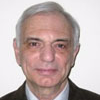This is a recorded presentation available from January 17, 2013.
This is a recorded presentation available from January 17, 2013. You can watch the recorded session at our HETS YouTube Channel or right here.
We present an experience of providing students with an opportunity of having more contact hours with an instructor in the video conference mode. The educational system Blackboard 9 provides such opportunity free of charge for the students. We have used this technique for a post-calculus course taught in a community college with additional hours available in the comfort of the students’ homes. We demonstrate a possibility of handwriting during the video conference using a portable additional video camera and discuss some technical and human problems that we have mentioned. Most of the students demonstrated positive attitude while some of them were not fully comfortable in the online environment and preferred personal communications only. We discuss short- and long-term perspectives of this teaching technique.
Institution: Hostos Community College
Language: English
Presented by:
 Dr. Alexander Yan Vaninsky is currently a Professor of Mathematics at Hostos Community College, City University of New York. He received his masters’ degree in mathematics from Moscow State University, in electrical engineering – from Moscow Power Engineering Institute, in mathematics education – from Brooklyn College; Ph.D. and D. Sc. degrees in mathematical economics – from Moscow Finance University. His research interests include applied mathematics and technology-based mathematics education.
Dr. Alexander Yan Vaninsky is currently a Professor of Mathematics at Hostos Community College, City University of New York. He received his masters’ degree in mathematics from Moscow State University, in electrical engineering – from Moscow Power Engineering Institute, in mathematics education – from Brooklyn College; Ph.D. and D. Sc. degrees in mathematical economics – from Moscow Finance University. His research interests include applied mathematics and technology-based mathematics education.
